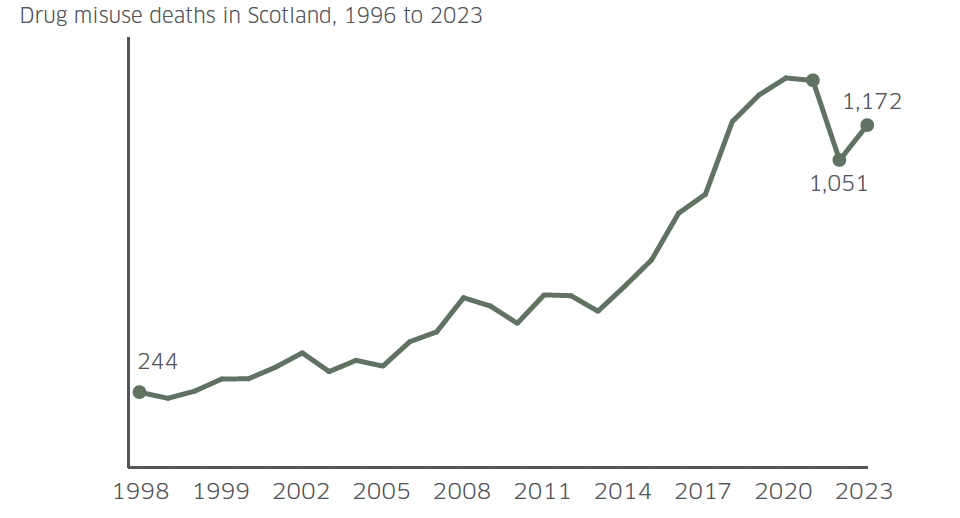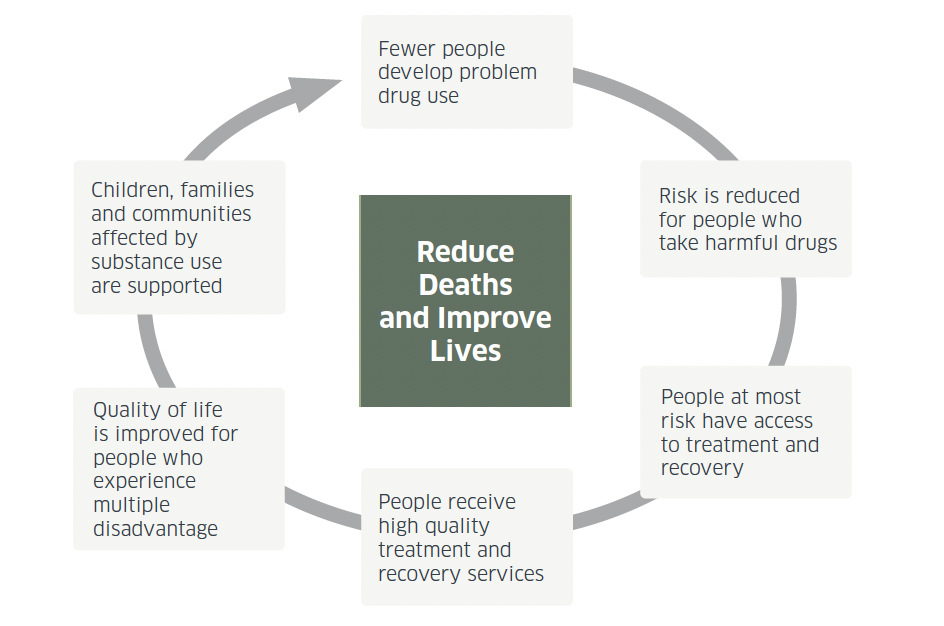National Mission on Drugs: annual report
Sets out the progress made between 1 April 2023 and 31 March 2024 by national government, local government and third sector partners towards reducing drug deaths and improving the lives of those impacted by drugs in Scotland.
1. Introduction
1.1 Overview
This third annual report sets out the progress made from 1 April 2023 to 31 March 2024 against the National Mission Plan. A separate analytical report monitoring the progress of the National Mission over the same timeframe will be published later in the year.
On 20th January 2021, the former First Minister Nicola Sturgeon made a statement to Parliament which set out a National Mission to reduce drug deaths and improve lives through a range of improvements to treatment, recovery and other support services.
In the first year of the National Mission, we built important foundations for change, and the first annual report set out our year one commitments and progress from 1 January 2021 to 31 March 2022. The second annual report set out year two commitments and progress from April 2022 to March 2023.
The National Mission annual report is structured to relate to the six outcomes and six cross-cutting priorities in the National Mission Plan, finance, reporting, monitoring and evaluation. Outcomes and cross-cutting priorities chapters have the following format: an overview provides context, including data, to understand the scope and purpose of the outcome.
An overview provides context, including data, to understand the scope and purpose of the outcome.
Progress in 2023-24 sets out our activities related to the outcome throughout the reporting period: the projects being delivered across sectors, locally and nationally have been highlighted, including dedicated funding and case studies. High level plans for the period 2024-25 are also set out. The finance chapter provides summary statements, by theme and area for the reporting period, and Government’s commitment against forecasts. Monitoring and evaluation describes governance and reporting arrangements: how groups and boards work together, and how we are ensuring accountability of the National Mission.
The loss of lives as a result of drugs in Scotland is devastating, and the latest statistics are a very harsh reminder of challenges we continue to face.
In 2023, there were 1,172 drug misuse deaths registered in Scotland[2]. This was an increase of 12% (121 deaths) compared with 2022. Drug misuse deaths are still much more common than they were in 2000. After adjusting for age, there were 4.2 times as many drug misuse deaths in 2023 than in 2000.
In 2022 (the most recent data available for the UK as a whole), the rate of drug poisoning deaths in Scotland was more than double the rates of other UK countries. This is similar to the longer-term trend, with Scotland having a higher drug death rate than other parts of the UK for the last decade.

Source: Drug-related deaths in 2023, National Records of Scotland, 2024
Police Scotland management information[3] provides an indication of recent trends in suspected drug deaths in Scotland. There were 320 suspected drug deaths between January and March 2024. This was 8% (23) higher than the previous quarter and 7% (22) higher than during the same period of 2023. Following a downward trend from early 2021 to late 2022, the rolling 12-month total of suspected drug deaths has risen over the last year.
We know from surveillance data that the rise of synthetic drugs, such as nitazenes, is playing an increasing role in harms. Nitazenes are potent synthetic opioids, and due to their unexpected presence in the drug supply, they pose a substantial risk of overdose, drug-related hospitalisation and drug-related death. Our Rapid Action Drug Alert and Response (RADAR) first issued a warning for nitazenes in March 2023, and since then, detections of nitazenes have continued to rise.
The Scottish Government recognises the threat posed by synthetic opioids and is providing an emergency response. In 2023-24, we stepped up activity of the National Drug Death Incident Management Team (IMT), which issued interim guidance for local areas on identifying and responding to drug harm clusters. A number of data and surveillence improvements have also been made, allowing us to respond to emerging threats quickly (see 2.2.4 for more detail). We have also have been exploring the use of nitazene test strips with Dundee University and progressing drug checking facilities (discussed further in 4.2.3). Alongside progressing activity in surveillance and harm reduction, our next steps for 2024-25 will be to prioritise our communications strategy, to ensure people who use drugs, and their families, have access to accurate information in a timely manner.
1.2 Taskforce Response/Cross Government Approach
In July 2022, the Scottish Drug Deaths Taskforce published its final report, Changing Lives, containing 20 recommendations and 139 actions. It called for the Scottish Government to respond to the report within six months. The Taskforce was clear that change is needed, and that change is possible. This change will require a whole system, cross-government approach.
We published our response, Drug Deaths Taskforce Response: A Cross Government Approach, in January 2023, which set out a number of actions to be taken forward across portfolios. Alongside this, a detailed response to each of the 139 actions was provided.
Our response contained three sections: section one covered the recommendations that require a cross-government approach, section two covered the recommendations that are specific to drugs policy and services, and section three sets out the stigma action plan (see section 2.2.3 for more details).
Two transformational principles underpin our response. Across government, we are committed to:
- treating problem drug use as any other health condition is treated, insofar as is possible within devolved competence, and
- ensuring that people affected by substance use are involved in government policy and strategy development that affects them.
Taking this approach will help ensure that people are able to access the services they need and are entitled to without fear of discrimination. Developing policy and strategy with the people that are affected by it helps to ensure that services are accessible and meet the needs of their users.
The cross-government action plan identified activity across government portfolios which have mobilised to support the National Mission — from employment programmes, to justice, transport to education, and across the health and social care sector. The plan highlights existing work, outlines new initiatives, and details ways that policy is being refocused to better support the needs of people who use drugs.
1.3 National Mission Partners
The National Mission is a collective endeavour. We work with key partners across public policy and beyond. Our key stakeholders and partners are detailed below.
Integration Authorities (IAs) are responsible for integrating certain health and social care services provided by or for Area Health Boards and Local Authorities such as alcohol and drug services. IAs have oversight of planning, designing, and commissioning services and ensure the design and delivery of efficient, integrated services. IAs were established in 2014 in each local council area and, except in Highland, have been established as Integration Joint Boards (IJBs), and in many local areas the integrated services are identified as being provided by a Health and Social Care Partnership (HSCP) rather than separately though Health Boards and Local Authorities.
Area Health Boards (HBs) are responsible for the prevention and the treatment of disease. HBs have delegated responsibility for specific healthcare functions and related budgets to IAs, and this includes some care and support functions for people impacted by substance use.
National Health Boards are specialised and include Public Health Scotland, Health Improvement Scotland, Scottish Ambulance Service.
Local Authorities (LAs) are responsible for providing social care and social work services, including support services for people impacted by substance use, and have delegated responsibility for specific functions and related budgets to IAs.
Alcohol and Drug Partnerships (ADPs) are multi-disciplinary, non-statutory partnerships established at local authority level to bring together organisations (including statutory and third sector organisations, the Police, and the Scottish Prison Service) that are all working to tackle alcohol and drug issues locally.
Key Third Sector Partners (KTSPs) provide vital expertise and services to support those with substance use problems and their families. This includes peer-led delivery of services and maintaining recovery communities.
- Crew (Scotland) is a nationwide public health charity that aims to reduce the harm and stigma associated with psychostimulant drug use.
- Scottish Drugs Forum is a drugs policy and information agency, working to reduce drugs harm in Scotland and provide a wide range of training and support to people who use substances and to people working in the sector.
- Scottish Families Affected by Alcohol and Drugs support families across Scotland who are affected by a loved one’s substance use and raise awareness of the issues affecting them.
- Scottish Recovery Consortium is a recovery-oriented charity that builds and promotes recovery in Scotland.
- With You is a charity that provides free confidential support to people who are experiencing issues with drugs, alcohol, or mental health.
Other third sector organisations are also supported via grant funding and make an invaluable contribution to delivery.
Corra Foundation deliver funding programmes for grass roots and third sector organisations for the National Mission on behalf of the Scottish Government.
Justice partners including Police Scotland, Crown Office, and Procurator Fiscal Service (COPFS), Scottish Prison Service and Community Justice.
1.4 Key Publications and Milestones
27 June 2023
Drug and alcohol information system (DAISy) report, published by PHS, providing an overview of initial assessments for specialist drug and alcohol treatment in 2021-22 and 2022-23
7 July 2023
Drug law reform paper, A Caring, Compassionate and Human Rights Informed Drug Policy for Scotland. sets out what a progressive, evidence-based drugs policy would look like
21 July 2023
Whole Family Approach: rapid review of literature focuses on examples of best practice in the context of substance use and implications for the training and learning development of substance use practitioners and wider workforce
22 August 2023
National statistics publication of Drug-related Deaths in Scotland in 2022, published by National Records Scotland
26 September 2023
The Alcohol and Drug Partnerships (ADP) 2022/23 Annual Survey, evidences progress of the National Mission by providing information on the activity undertaken by ADPs
01 November 2023
National Collaborative Analysis Report, outlines findings from the National Collaborative’s call for evidence
6 December 2023
Drugs and Alcohol Workforce Action Plan sets out the key actions we will deliver over the next three years to address challenges experienced by the drugs and alcohol sector’s workforce
11 December 2023
A draft outline of a Charter of Rights to support people affected by substance use to realise their rights
19 December 2023
Analysis of the progress made against the National Mission in the Annual Monitoring Report 2022-23
13 February 2024
Initial findings from the Public Health Scotland evaluation of the residential rehabilitation programme to assess impact, organisation and accessibility
19 March 2024
Mapping of stabilisation, detoxification and other crisis support providers in Scotland to assess current level of provision and how services are governed and funded
26 March 2024
New estimated prevalence of opioid dependence in Scotland between 2014-15 and 2019-20, published by Public Health Scotland
1.5 Outcomes Framework
The National Mission outcomes framework articulates our aim to reduce drug deaths and improve the lives of those impacted by drugs. It is structured around the six outcomes and six cross-cutting priorities we believe are necessary to achieve this aim. The framework is presented in more detail in Annex A.

Cross-Cutting Priorities
- Lived Experience at the Heart
- Equalities and Human Rights
- Tackle Stigma
- Surveillance and Data Informed
- Resilient and Skilled Workforce
- Psychologically Informed
Contact
There is a problem
Thanks for your feedback